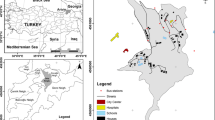Abstract
This paper concentrates on empirical and methodological issues of the application of econometric methods to modelling real estate market. The presented hedonic analysis of apartments’ prices in Wrocław is based on the dataset consisting of over ten thousands offers from the secondary real estate market. The models estimated as the result of the research allow for pricing the apartments, as well as its characteristics.The foundations of hedonic methods are formed by the so-called hedonic hypothesis which states that heterogeneous commodities are characterized by a set of attributes relevant both from the point of view of the customer and the producer. As a consequence, the price of a commodity is determined as an aggregate of values estimated for each significant characteristic of this commodity. The hedonic model allows to price the commodity as well as to identify and estimate the prices of respective attributes, including the prices which are not directly observable on the market. The latter is particularly useful for the real estate market as it enables pricing location-related, neighbourhood-related and structure-related characteristics of housing whose values cannot be obtained otherwise.
Access this chapter
Tax calculation will be finalised at checkout
Purchases are for personal use only
Similar content being viewed by others
References
Belsley, D. A., Kuh, E., & Welsh, R. E. (1980). Regression Diagnostics: Identifying Influential Data and Sources of Collinearity. Wiley Series in Probability and Mathematical Statistics. New York: Wiley.
Berndt, E. R., Griliches, Z., & Rappaport, N. J. (1995). Econometric estimates of prices indexes for personal computers in the 1990s. Journal of Econometrics, 68(1), 243–268.
Boskin, M. J., Dulberger, E. R., & Griliches, Z. (1996). Toward a more accurate measure of the cost of living: final report. Washington: Diane Publishing Company.
Box, G. E. P., & Cox, D. R. (1964). An analysis of transformations. Journal of the Royal Statistical Society. Series B (Methodological), 26(2), 211–252.
Brachinger, H. W. (2002) Statistical Theory of Hedonic Price Indices. DQE Working Papers, 1, Department of Quantitative Economics. Switzerland: University of Freiburg/Fribourg.
Can, A. (1992). Specification and estimation of hedonic housing price models. Regional Science and Urban Economics, 22(3), 453–474.
Court, A. (1939). Hedonic Price Indexes with Automotive Examples. The dynamics of automobile demand. New York: General Motors Corporation (pp. 99–117).
Dziechciarz, J. (2004). Regresja Hedoniczna. Próba Wskazania Obszarów Stosowalności. In A. Zelias (Ed.) Przestrzenno-czasowe Modelowanie i Prognozowanie Zjawisk Gospodarczych. Kraków: Wydawnictwo Akademii Ekonomicznej w Krakowie (pp. 163–175).
Greene, W. H. (2011). Econometric analysis, 7th edn. New Jersey: Prentice Hall.
Haas, G. C. (1922). Sale Prices as a Basis for Farm Land Appraisal. Technical Bulletin 9, University of Minnesota, Agricultural Experiment Station.
Herath, S., Maier, G. (2010). The Hedonic Price Method in Real Estate and Housing Market Research. A Review of the Literature. SRE-Discussion Papers, 2010/03, WU Vienna University of Economics and Business, Vienna.
Sheppard, S. (1999). Hedonic Analysis of Housing Markets. In: P.C. Cheshire & E.S. Mills (Eds.) Handbook of regional and urban economics Vol. 3, (pp.1595–1635). Amsterdam: Elsevier.
Triplet, T. J. (2006). Handbook on hedonic indexes and quality adjustments in price indexes. OECD Directorate for science, technology and industry. Paris: OECD Publishing.
Triplett, J. (1986). The economic interpretation of hedonic methods. Survey of Current Business, 36(1), 36–40.
Wallace, H. A. (1926). Comparative farmland values in iowa. The Journal of Land and Public Utility Economics, 2(4), 385–392.
Waugh, F. V. (1929). Quality as a determinant of vegetable prices. New York: Columbia University Press,
White, H. (1980). A heteroskedasticity-consistent covariance matrix estimator and a direct test for heteroskedasticity. Econometrica, 48(4), 817–838.
Wooldridge, J. M. (2010). Econometric analysis of cross section and panel data, 2nd edn. Cambridge: The MIT Press.
Author information
Authors and Affiliations
Corresponding author
Editor information
Editors and Affiliations
Rights and permissions
Copyright information
© 2015 Springer-Verlag Berlin Heidelberg
About this paper
Cite this paper
Król, A. (2015). Application of Hedonic Methods in Modelling Real Estate Prices in Poland. In: Lausen, B., Krolak-Schwerdt, S., Böhmer, M. (eds) Data Science, Learning by Latent Structures, and Knowledge Discovery. Studies in Classification, Data Analysis, and Knowledge Organization. Springer, Berlin, Heidelberg. https://doi.org/10.1007/978-3-662-44983-7_44
Download citation
DOI: https://doi.org/10.1007/978-3-662-44983-7_44
Publisher Name: Springer, Berlin, Heidelberg
Print ISBN: 978-3-662-44982-0
Online ISBN: 978-3-662-44983-7
eBook Packages: Mathematics and StatisticsMathematics and Statistics (R0)




